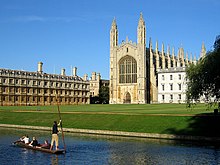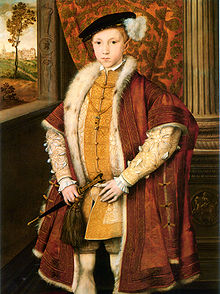
Christopher Tye (c.1505 – before 1573) was an English Renaissance composer and organist. Probably born in Cambridgeshire, he trained at the University of Cambridge and became the master of the choir at Ely Cathedral. He is noted as the music teacher of Edward VI of England and was held in high esteem for his choral music, as well as chamber works such as his 24 polyphonic In nomines. It is likely that only a small percentage of his compositional output survives, often only as fragments; his Acts of the Apostles was the only work to be published in his lifetime.
He ceased composing when he became a clergyman, returning to Ely Cathedral and later becoming rector of Doddington, Cambridgeshire. Today, he is perhaps best known for the hymn "Winchester Old", based on a theme from Acts of the Apostles, which forms the basis of the most commonly performed version in the United Kingdom of "While Shepherds Watched Their Flocks".[1]
Beginnings[edit]

Christopher Tye is believed to have been born in Cambridge, England. Little is known about his origins. The first references to him are when he attended and received his Bachelor of Music degree in Cambridge in the year 1536. It is because of this that his birth date is believed to be around 1505. The next year, in 1537, he took up a position as a lay clerk at King's College. Based on recorded financial records we know that by 1543 he took up a more prestigious position as the Magister Choristarum at Ely Cathedral with an annual salary of ten English pounds. Shortly, thereafter, in 1545 the University of Cambridge saw fit to bestow upon Tye the degree of Doctor of Music.[2]
Work with the Royal Court[edit]

The composer's career shows that he had a strong connection to Dr. Richard Cox, who was a passionate church reformer and a tutor of King Edward (then Prince Edward). This affiliation would prove to have a strong influence on him for the rest of his life. Dr. Cox was also the person who very probably introduced Tye to the royal court. It is believed that this led to Christopher Tye being a kind of musical adviser of the court who worked closely with Edward.[3] In 1605, Samuel Rowley (believed to be Tye's grandson) wrote a play entitled When You See Me, You Know Me. In the play, Tye and King Edward play important roles and exchange dialogue where Edward identifies 'Doctor Tye' as 'Our music's lecturer.'[4]
Later, in 1553, Christopher Tye published his rhymed scriptural paraphrase, The Actes of the Apostles. In it he takes the ideas set forth in the book of 'Acts' in the Bible and sets them to meter. Although it was met with divided reviews (even today), the work is hugely important because it is dedicated to Edward.[5] In the preface he goes into some detail that implies a kind of friendship between the two. Although it is never mentioned explicitly, it is generally assumed that Tye held a position in the Chapel Royal Staff during the 1550s at some point.[3][6]
Religious posts[edit]

In 1558, Tye took up his posting again at Ely, probably at the request of his old friend, Richard Cox. Soon, thereafter, Tye took it upon himself to take up a place in the ministry and thus ceased to compose music.[7] Dr. Richard Cox, who was bishop at Ely during this time, ordained the composer as a deacon and later as a priest in the same year. In 1561, Tye resigned from the post at Ely and was appointed to Doddington, Cambridgeshire, the richest benefice in England.[8] He is believed to have died there before March 1573 when his successor was appointed, although no record is found of his death.[3]
Works[edit]

As a pre-eminent court musician with strong Protestant leanings, Tye is generally considered to be one of the most influential English composers of his day. Even after his appointment in the ministry when his composing ceased, his reputation as a musician continued to spread. However, only one of Tye's works, Actes of the Apostles of 1553, a verse translation of the Acts of the Apostles into four part harmony, was published during his lifetime. Compared to his polyphonic works, this work is not well regarded, although it is from this collection that his most familiar piece is derived; the most common tune of "While Shepherds Watched Their Flocks".
His surviving Latin polyphonic choral works, most likely dating from the reign of Henry VIII include three full masses - the Peterhouse mass, a Westron Wynde mass and a six voice Missa Euge bone. Other surviving movements from psalms include Quaesumus omnipotens et misericors Deus, Miserere mei, Deus, Omnes gentes, plaudite manibus, Peccavimus cum patribus nostris.[9]
Some works only exist in parts or excerpts.[3] For example, it was only after laboriously reconstructing a supposedly missing bass voice part of the anthem "To Father, Son and Holy Ghost" that the editor Vladimir Fedorov discovered the 'missing' part.[10] Works such as O God, be merciful unto us have been revived.[11]
His In Nomines and other instrumental for four or five works survive, some of the earliest examples of chamber music.[12] Nigel Davison, writing in the Oxford Dictionary of National Biography suggests that given his reputation as an organist, it would be inconceivable that he composed no keyboard works and concludes that these must have also been lost.[9]
References[edit]
- ^ The Harvard University Hymn Book. Harvard University Press. 2007. p. 426. ISBN 978-0674026964.
- ^ [1] [dead link]
- ^ a b c d Doe and Mateer, "Tye, Christopher," in Grove Music Online.
- ^ Nan Cooke Carpenter (1960). "Christopher Tye and the Musical Dialogue in Samuel Rowley's 'When You See Me, You Know Me". Journal of Research in Music Education. 8 (2): 87. doi:10.2307/3344029. JSTOR 3344029. S2CID 145073328.
- ^ Robert W. Weidner (April 1972). "Tye's 'Actes of the Apostles:' A Reassessment". The Musical Quarterly. 58 (2): 243. doi:10.1093/mq/lviii.2.242. JSTOR 741305.
- ^ Hillebrand, Harold N. “The Early History of the Chapel Royal.” Modern Philology, vol. 18, no. 5, 1920, pp. 233–68. JSTOR website Retrieved 4 May 2023.
- ^ John Langdon (October 1972). "Tye and His Church Music". The Musical Times. 113 (1556): 1011–1015. doi:10.2307/955291. JSTOR 955291.
- ^ "Christopher Tye (c1505-before 15 March 1573) on Hyperion Records". Hyperion Records. Retrieved 16 November 2017.
- ^ a b Davison, Nigel (2004). "Tye, Christopher (c. 1505–1571x3)". Oxford Dictionary of National Biography (online ed.). Oxford University Press. doi:10.1093/ref:odnb/27931. ISBN 978-0-19-861412-8. Retrieved 12 August 2018. (Subscription or UK public library membership required.)
- ^ Vladimir Fedorov, Fontes Artis Musicae – Volume 31, Numéro 1, 1984, 33
- ^ Judith H. Blezzard (October 1973). "Christopher Tye: A Quartercentenary Note". The Musical Times. 114 (1568): 1051–1053. doi:10.2307/955420. JSTOR 955420.
- ^ Robert W. Weidner (1964). "The Instrumental Music of Christopher Tye". Journal of the American Musicological Society. 17 (3): 363–370. doi:10.1525/jams.1964.17.3.03a00070. JSTOR 830095.
External links[edit]
- Free scores by Christopher Tye in the Choral Public Domain Library (ChoralWiki)
- Free scores by Christopher Tye at the International Music Score Library Project (IMSLP)